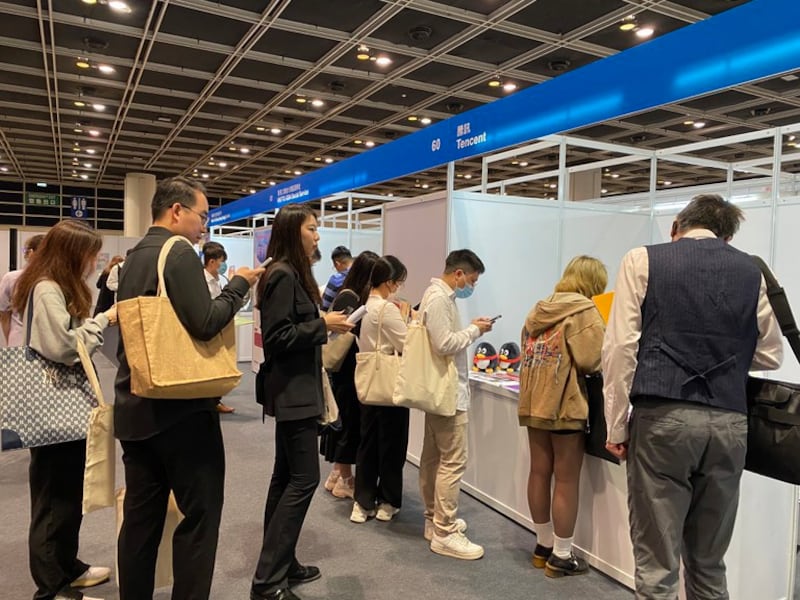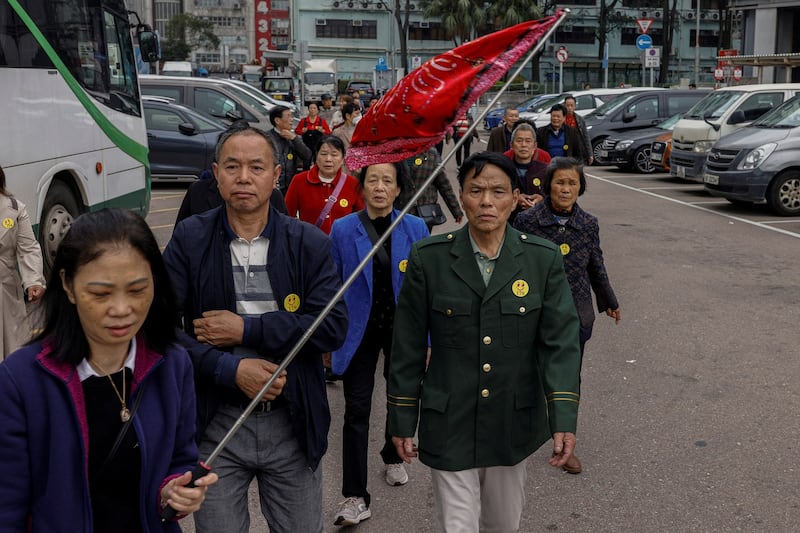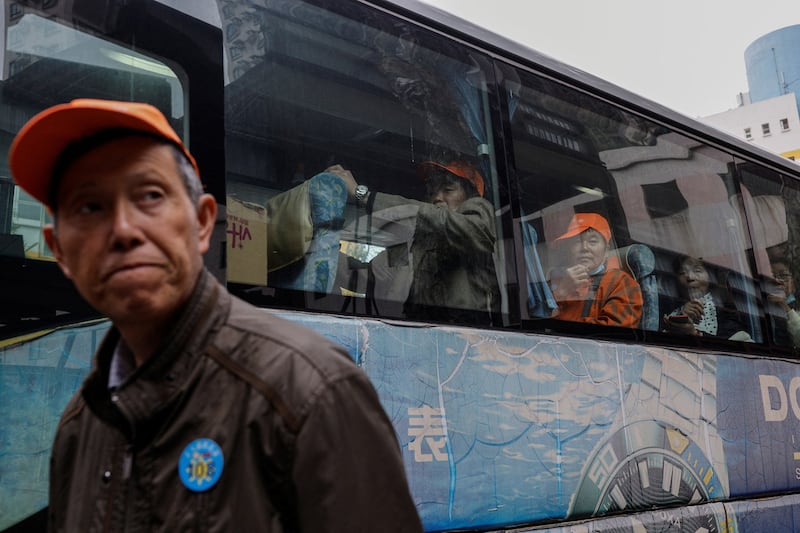Hong Kong is recruiting graduates from mainland China in an apparent bid to replace talent lost in the brain drain sparked by the imposition of a harsh security law in 2020.
Many graduates looking for work at a "Greater Bay Area" youth employment fair on Thursday hailed from mainland China rather than Hong Kong, although the heavily subsidized fair was ostensibly held to benefit young people in Hong Kong.
The event comes as Beijing seeks to drive greater integration between the former colonial cities of Hong Kong and Macau and their neighbors in Guangdong province, symbolized by the opening of the world's longest sea bridge linking cities across the Pearl River Delta in 2018.
Last month, China unveiled a new visa program that could draw a large influx of highly qualified people to live and work in Hong Kong, which has seen a mass exodus of people since the ruling Chinese Communist Party launched a crackdown on dissent in the wake of 2019 protests, while the Hong Kong government has announced it will hand out free air tickets to boost visitor numbers.
Companies that sign up for the employment scheme -- HSBC, Bank of China and Tencent all had a presence at the fair -- will receive a government allowance of H.K.$10,000 (U.S.$1,275) a month for 18 months, according to the city's labor department.
A recent finance graduate from mainland China who gave only the surname Chen said she is looking to land a job in a bank, and believes the Greater Bay Area – comprising Hong Kong, Shenzhen, Macau and Zhuhai – is an attractive place to live and work.
"I think there is more cultural crossover in the Greater Bay Area, which is where more foreigners come to do business, creating a lot of job opportunities," Chen said. "There are so many parts to the Greater Bay Area now, so maybe everyone can spread out to develop [their career] rather than just staying in one place."
‘I like the work culture’
A recent graduate from mainland China who gave only the surname Lin said she has lived in Hong Kong for the past six years, and is looking for a media job.
"I would choose Hong Kong to work in, because I like the work culture and professionalism," Lin said. "But mainland China's actually a bit more comfortable and convenient to live in, and the cost of living is lower."

A third graduate who gave the surname Huang said she had heard about the fair on the Xiaohongshu social media platform while studying for a master's degree at a mainland Chinese university.
According to a Labour Department press release, some 2,600 Hong Kong-based jobs will be offered in 35 organizations taking part in the fair, nearly half of which are in the catering, retail and hotel industries.
Most vacancies offer monthly salaries ranging from H.K.$12,000 to H.K.$23,000 (U.S.$1,530 - U.S.$2,930), compared with an average starting salary of around 6,000 yuan (U.S.$875) in mainland China.
Meanwhile, more than 400 mainland China-based jobs will be on offer in management, banking, editorial, engineering and business intelligence, among other categories, it said.
"For graduates, first of all, there are good salaries being offered at a reasonable level," labor bureau director William Ng said as the job fair opened. "Fresh graduates do not get such a high salary in the mainland, so it's a good starting salary for Hong Kong students."
Rail link
Meanwhile, plans are afoot to issue flexible commuter tickets for the Guangzhou-Shenzhen-Hong Kong Express Rail Link, a backbone of the Greater Bay Area, according to officials.
"The Mass Transit Railway Corp Ltd and the relevant mainland railway authorities have been studying and discussing the feasibility of 'metroization' of short haul services of the [high speed rail link]," secretary for transport and logistics Lam Sai-hung told lawmakers on March 29.
"Under the arrangement, ticket holders may flexibly alter the tickets to any other trains traveling to/from the same Mainland destination on the same day," Lam said.

Elsewhere in Hong Kong, older people have started flocking back to the city in their thousands on single-day, low-cost package tours that see them ushered into special restaurants by tour guides for lunch, to the annoyance of local residents.
Tourist traffic is returning to To Kwa Wan and Hung Hom in Kowloon, with long lines of mainland Chinese tourists waiting for buses or filing into a restaurant for their package-deal lunches.
Not all of them were happy customers, however.
"We've been waiting for 10 minutes now ... I have a pretty poor impression of Hong Kong -- not much space and poorly managed," a tourist who gave only the surname Chen told Radio Free Asia on Thursday.
"I hope they can open up more restaurants elsewhere and not just have them all concentrated in one place," a tourist who gave the surname Cheng said.
‘The food’s okay’
But a tourist surnamed Li said it wasn't so bad. "It's pretty good," she said. "People shouldn't demand perfection, as nothing is ever perfect."
"The food's okay," a tourist surnamed Xiao said. "We had fish, meat and vegetables -- at our age, we've gone through a lot of hard times, but things are okay now."
But a Hong Kong resident who gave only the surname Chow said the mainland tourists were a nuisance because they block the sidewalks.
"I told them to move out of the way in Mandarin, but they didn't seem to hear me," Chow said, adding that some of the tourists throw toothpicks on the sidewalk after picking their teeth, and spit.

Staff at the two main restaurants in To Kwa Wan catering for mainland tour groups said that an estimated 5,000 mainland Chinese tourists eat in the district every day.
Former pro-democracy lawmaker Ted Hui, who now lives in Australia, said there is considerable public opposition to mainland Chinese tour groups crossing the border in buses.
"There are whole industries dedicated to serving customers from mainland China, which makes people worry that Hong Kong is becoming more like the mainland – it reminds them of the wholesale mainlandization of Hong Kong ever since the [2014] Umbrella Movement and the [2019] protest movement," Hui said.
"That goes for education, the electoral system, the judiciary and the government, which people in Hong Kong feel is a deterioration, a retrograde step, and that the old advantages of the past have been lost," he said.
Translated by Luisetta Mudie. Edited by Malcolm Foster.

